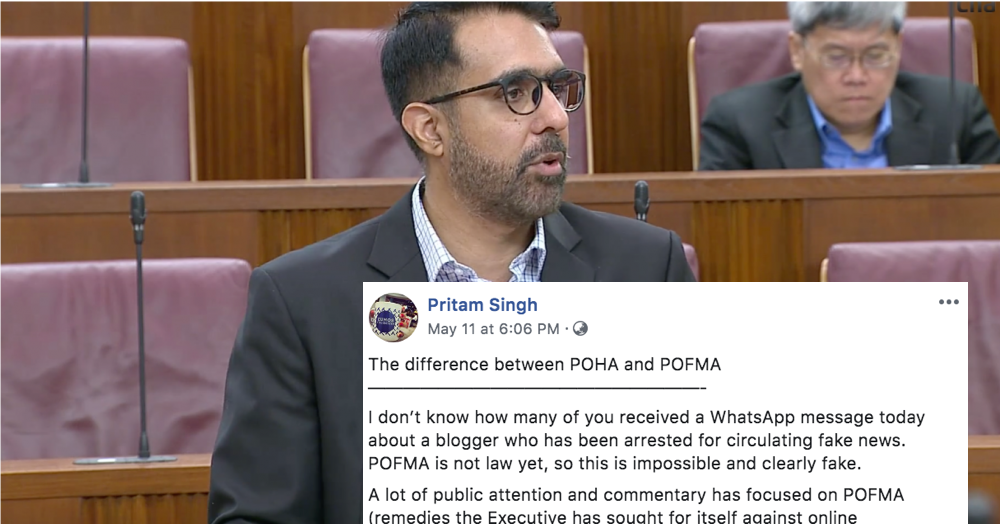The Parliament debates in the second week of May 2019 discussed extensively the Protection from Online Falsehoods and Manipulation Act (POFMA), which has been referred to as the "Fake News Bill".
The majority of the Members of Parliament voted to pass the Bill, except for nine MPs from the Workers' Party (WP).
Fake news circulating via WhatsApp
After the Bill was passed, it appeared that a WhatsApp message about a blogger being arrested for spreading fake news began circulating around.
Talk about irony.
Because that itself is a piece of fake news, the WP's Secretary-General Pritam Singh pointed out via a Facebook post on May 11, 2019:
"I don’t know how many of you received a WhatsApp message today about a blogger who has been arrested for circulating fake news. POFMA is not law yet, so this is impossible and clearly fake."
This means that even though the Fake News Bill has been passed, it has not become a law yet, which is why the WhatsApp message cannot be true.
How a Bill becomes law?
After the Bill is passed by Parliament, it will be forwarded to the Presidential Council for Minority Rights (PCMR) first to ensure it is fair to all race and religion.
It will then be presented to the President Halimah Yacob for her approval, which will turn the Bill into law.
Then the minister in charge of the Act will have to decide and announce when the Act will come into force.
How POHA and POFMA affect people differently
Pritam's post goes beyond just alerting a piece of fake news.
He also succinctly clarified the two buzzwords, or more accurately buzz-acronyms -- POFMA and POHA.
In doing so, he highlights why people should probably pay more attention to POHA as it is likely to affect us more.
"In fact, we are likely to see POHA being used far more often by individuals and companies to stop/correct online falsehoods made against them by other individuals or companies."
What is POHA?
If you google POHA, you might get this:

But nope, Parliament definitely did not spend time debating about a type of flattened rice.
POHA refers to another Bill: Protection from Harassment Act (POHA).
If you are wondering what POHA does, it has the same function as POFMA fundamentally.
As explained in Pritam's post, both are created as "stop publication orders, correction orders, orders that apply to tech companies".
Three main differences
Pritam's post also summarised three differences between POHA and POFMA.
# 1 Difference in the users of POFMA or POHA
POFMA is used by the Executive (likely to be a minister) to mitigate fake news.
POHA is used by individuals and companies when there is fake news about them.
#2 Difference in who can be charged with the Bills
The Executive can use the POFMA against individual and companies who spread fake news.
Similarly, individuals and companies can use POHA against individuals and companies that spread fake news.
However, they cannot use POHA against the Executive.
This was something raised by Pritam in Parliament as the rule of law should apply equally to all.
In response, here are the replies from the Senior Minister of State Edwin Tong:
“As to how government officers can be held accountable, that can always be done in a usual forum, like Parliament.”
“The government has taken a view that it will not avail itself of remedies under the Protection from Harassment Act (POHA), and likewise, it will not be subject to provisions under POHA.”
#3 Difference in processes
POFMA is likely to be executed much faster than POHA.
The Executive can directly order correction or termination to the fake news made against it, as long as it is in the public interest to do.
However, individuals and companies who use POHA for the same purpose have to make an application to the Courts to stop any false claims about them.
An interim order can be given if the fake news has wider implications.
Here's an example from Pritam:
"For example, under POHA, an applicant can secure an interim order (arising from an urgent application) to inform readers that a particular post has been flagged for correction. So for example, if an anonymous person put out a falsehood that NTUC FairPrice was selling plastic rice or halal pork and the message started to go viral, one can understand how important it may be for the Courts to quickly deal with such fake news for the applicant, namely NTUC."
Even for urgent POHA applications, it can still take up a day or two.
"Arising from questions from the Workers’ Party during the POHA debate, SMS for Law Edwin Tong said the Courts can try to deal with an urgent application in a few hours, but also added this would turn on the evidence the Court needed to consider. Under POFMA, Minister Shanmugam clarified that the Government has not pretended that an application under POHA could be heard in a matter of hours – Minister hoped it could be done in two days and in a suitable case, perhaps a day."
WP also raised a few other questions with regard to POHA:
You can see Pritam's full post here too:
Top photo edited from screenshot of Parliament video
If you like what you read, follow us on Facebook, Instagram, Twitter and Telegram to get the latest updates.
